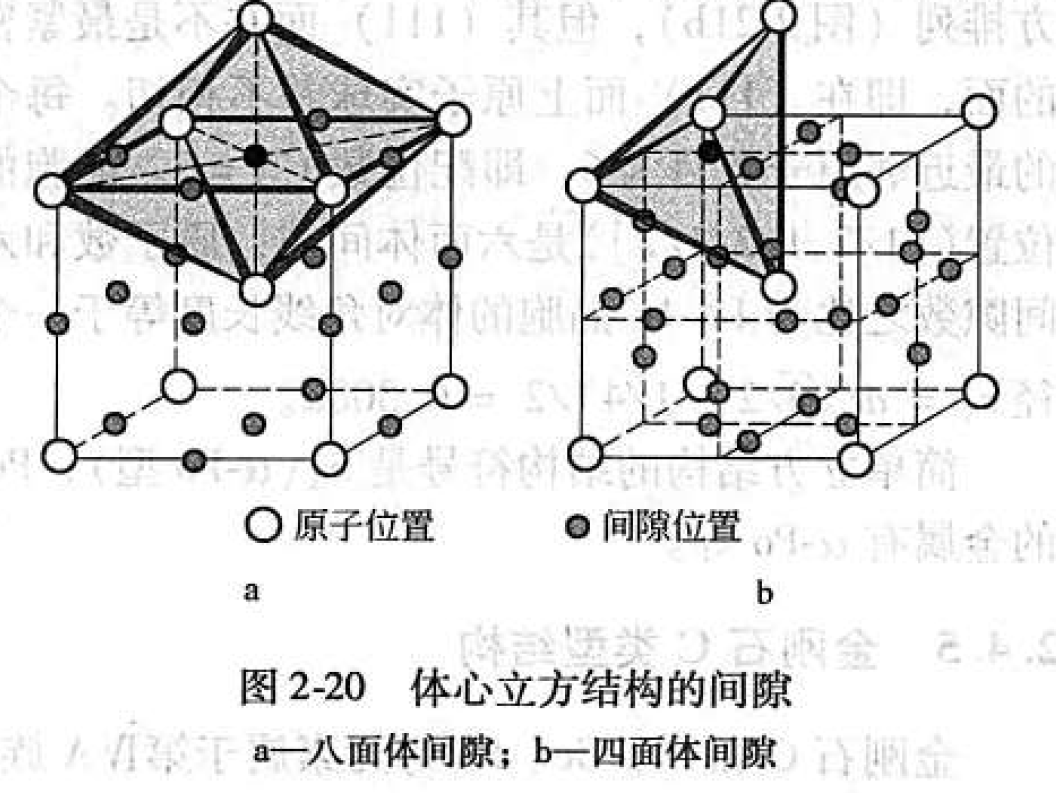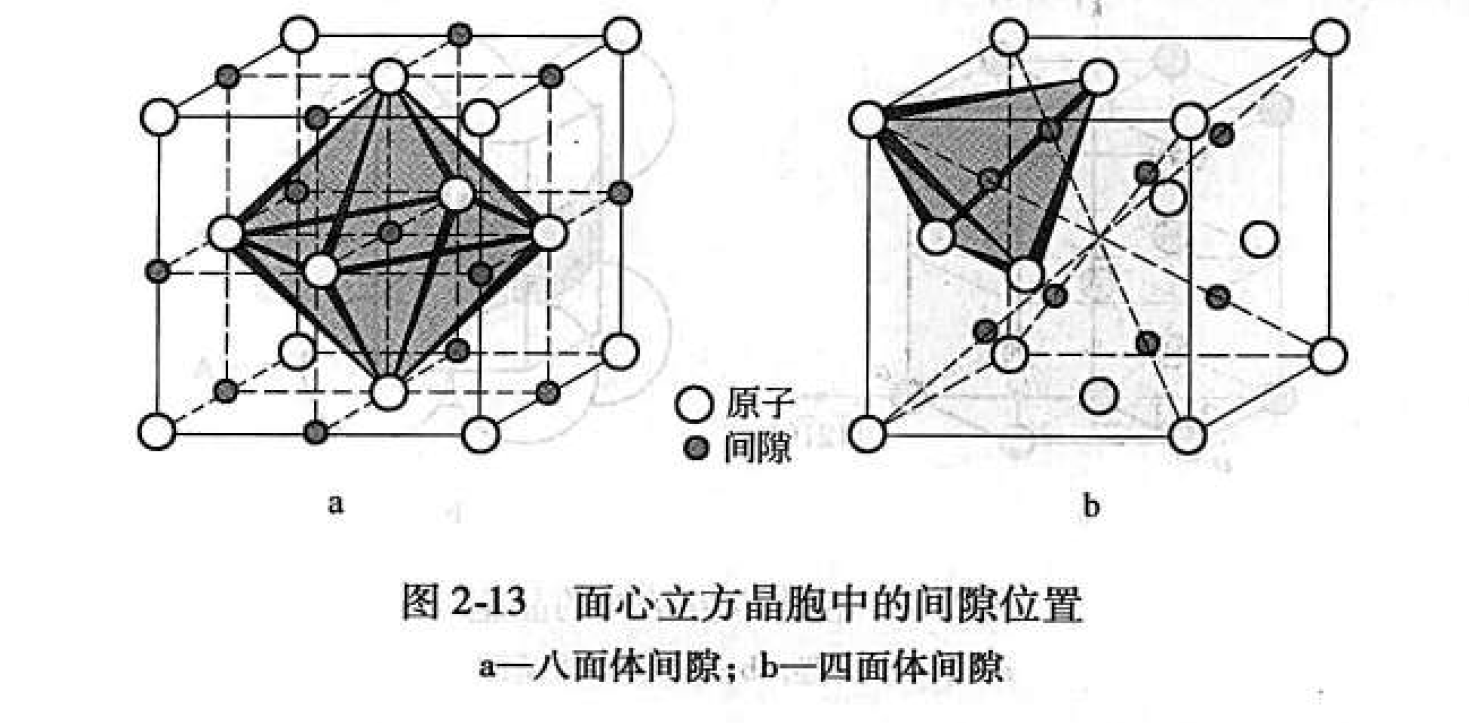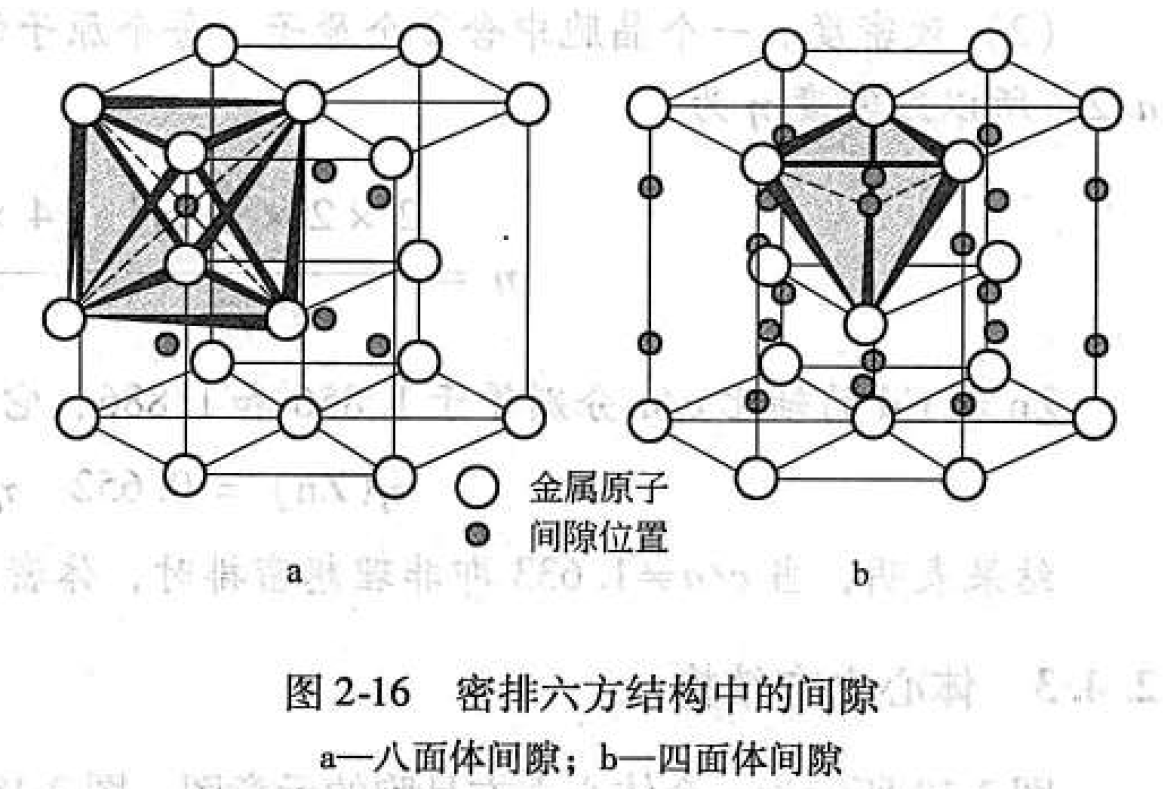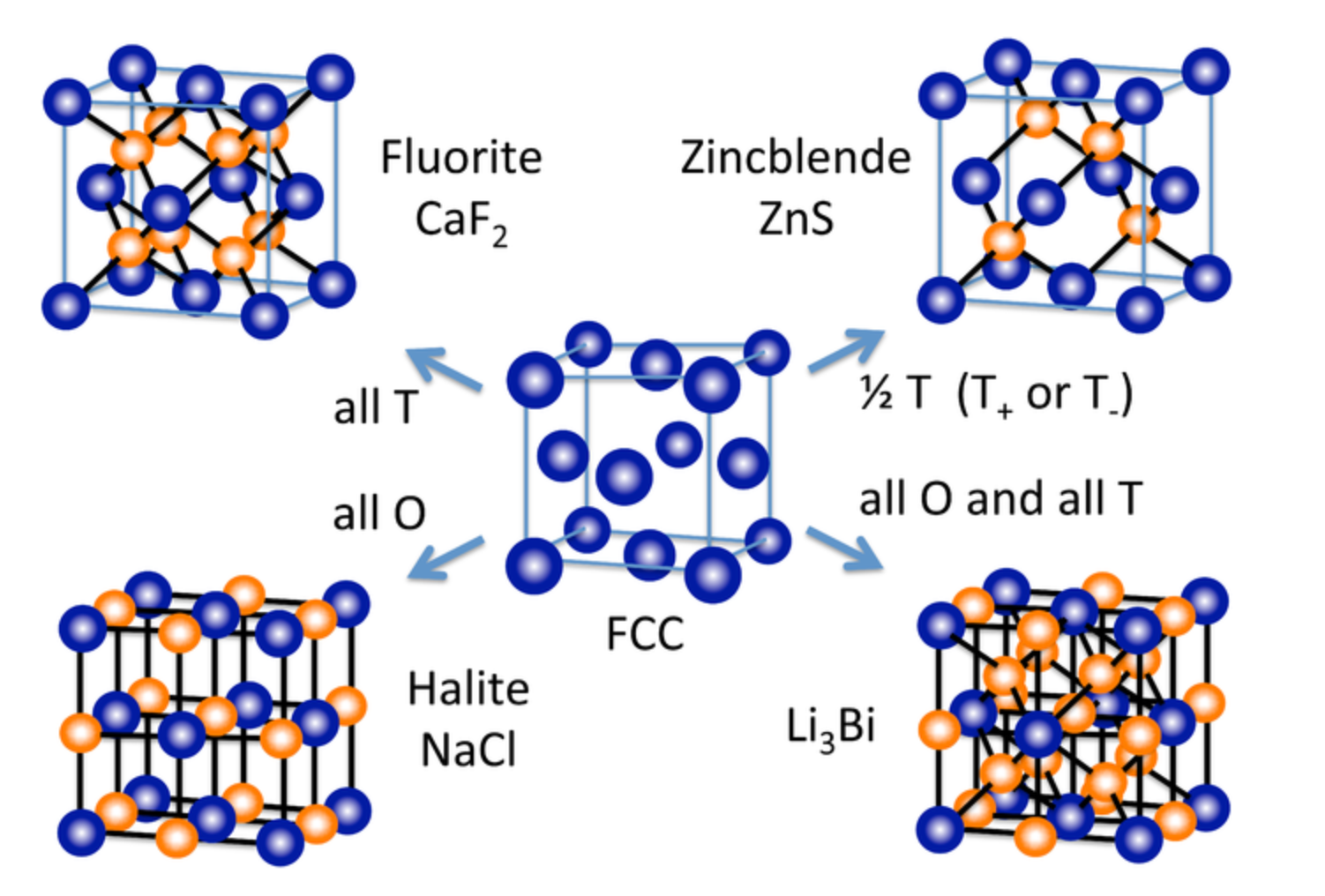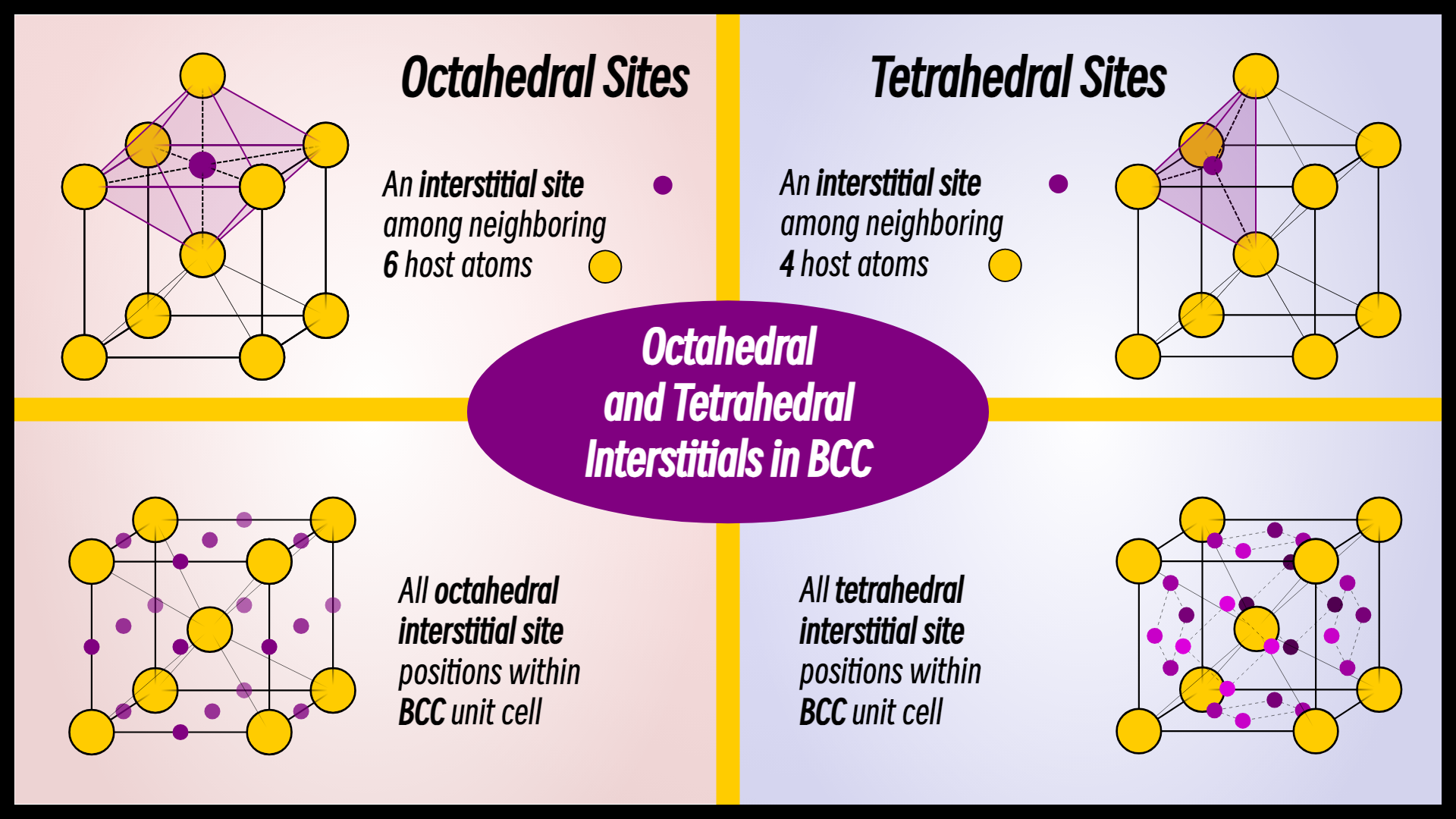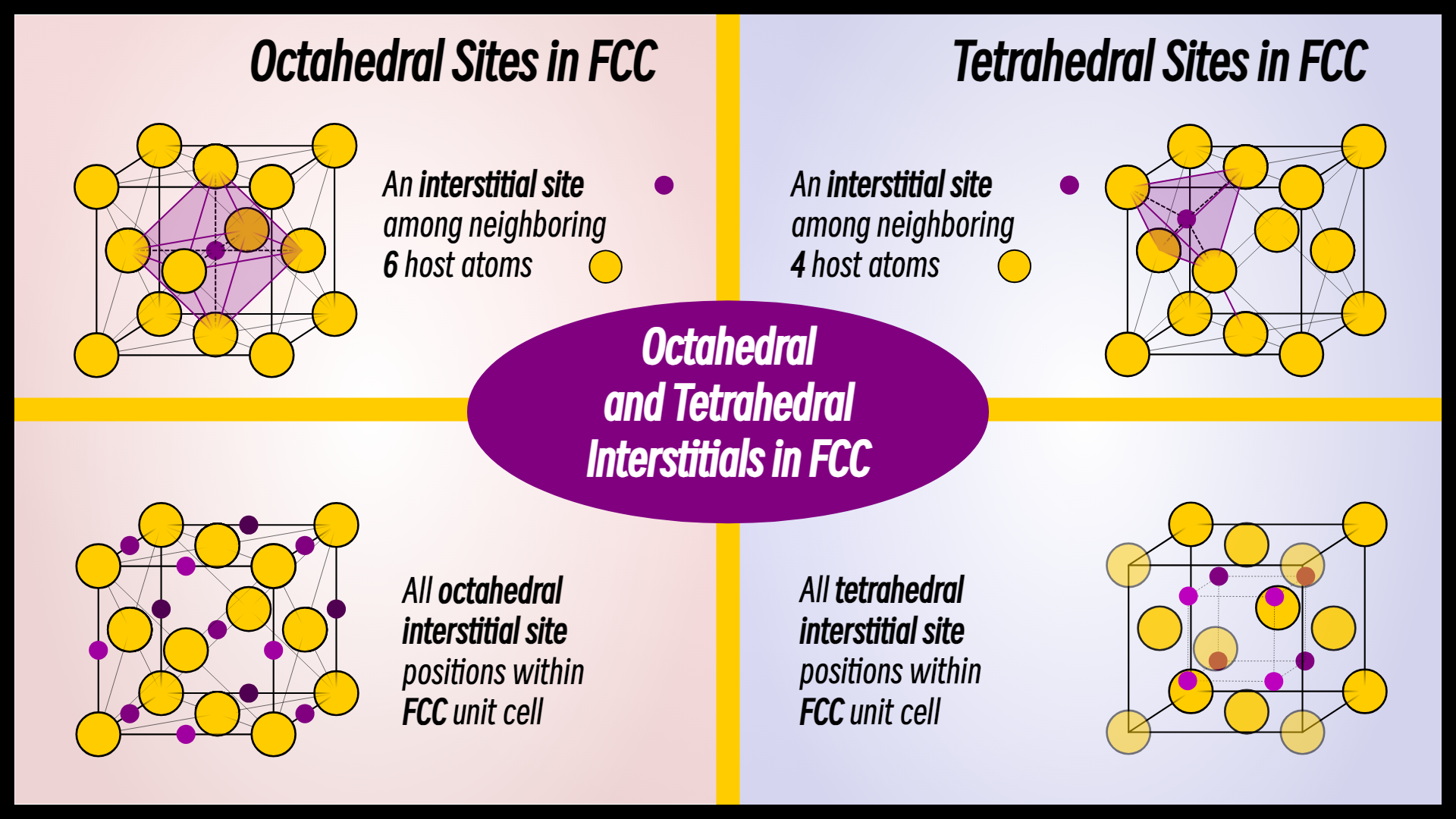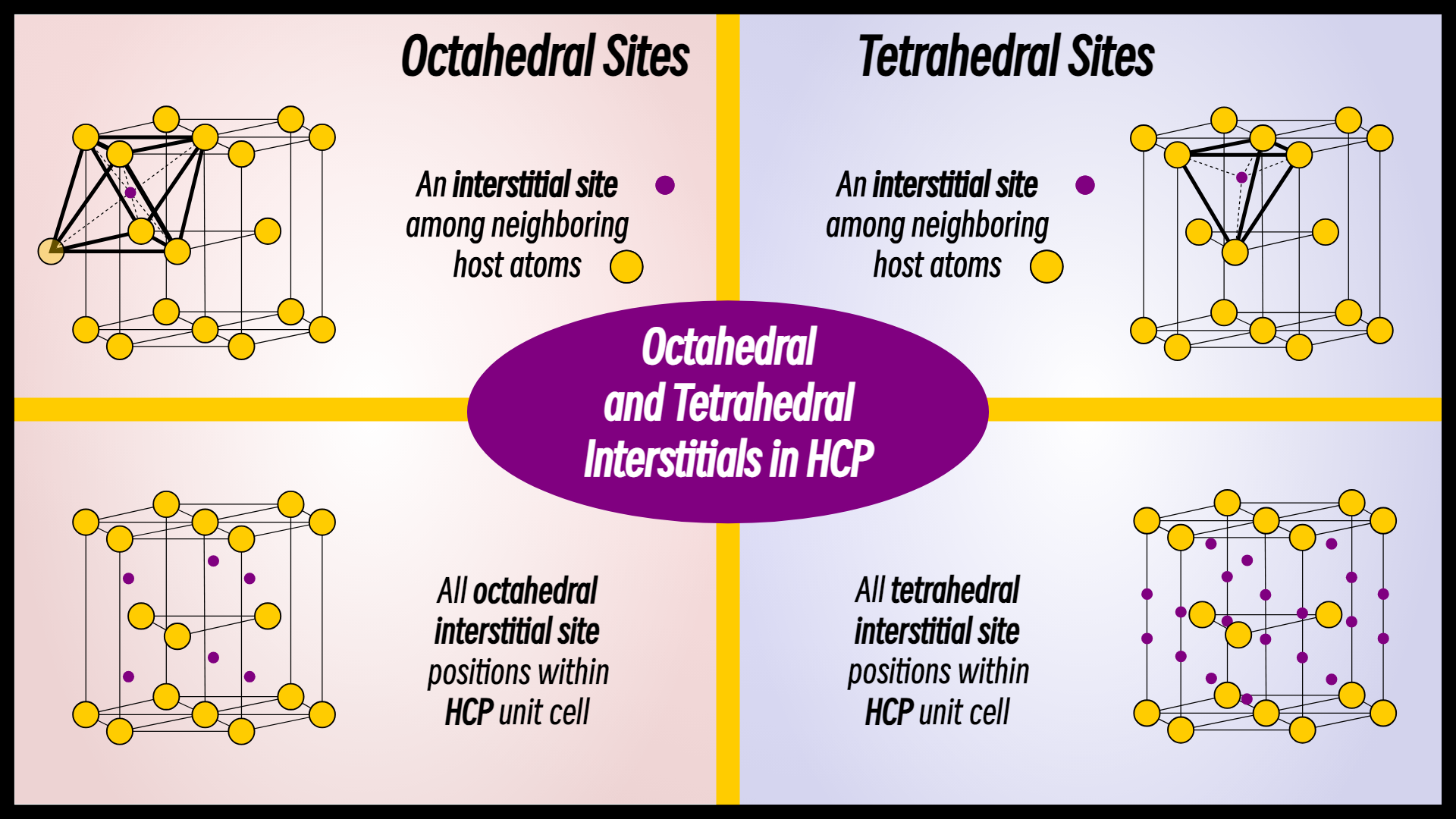金属常见晶体结构的间隙原子位点¶
约 605 个字 124 行代码 7 张图片 预计阅读时间 4 分钟
注:以下 3 张示意图均来自教材书籍:余永宁《金属学原理》
BCC 结构¶
- BCC 结构间隙位置示意图
- latgen 中关于 BCC 间隙原子位置的选项(6 个八面体间隙 + 12 个四面体间隙)
# 八面体间隙(扁八面体)
There are 6 octahedral interstitial sites within lattice BCC(001):
1) [0.5 0 0]
2) [0 0.5 0]
3) [0.5 0.5 0]
4) [0 0 0.5]
5) [0 0.5 0.5]
6) [0.5 0 0.5]
# 四面体间隙
There are 12 tetrahedral interstitial sites within lattice BCC(001):
7) [0.25 0.5 0]
8) [0.75 0.5 0]
9) [0.5 0.25 0]
10) [0.5 0.75 0]
11) [0.5 0 0.25]
12) [0 0.5 0.25]
13) [0 0.25 0.5]
14) [0 0.75 0.5]
15) [0.25 0 0.5]
16) [0.75 0 0.5]
17) [0 0.5 0.75]
18) [0.5 0 0.75]
FCC 结构¶
- FCC 结构间隙位置示意图
- latgen 中关于 FCC 间隙原子位置的选项(4 个八面体间隙 + 8 个四面体间隙)
# 八面体间隙(晶胞各个棱的中点)
There are 4 octahedral interstitial sites within lattice FCC(001):
1) [0.5 0.5 0.5]
2) [0.5 0 0]
3) [0 0.5 0]
4) [0 0 0.5]
# 四面体间隙(体对角线离顶点的 1/4 处)
There are 8 tetrahedral interstitial sites within lattice FCC(001):
5) [0.25 0.25 0.25]
6) [0.25 0.25 0.75]
7) [0.25 0.75 0.25]
8) [0.75 0.25 0.25]
9) [0.75 0.75 0.75]
10) [0.75 0.75 0.25]
11) [0.75 0.25 0.75]
12) [0.25 0.75 0.75]
HCP 结构¶
- 间隙原子位置基于如下的 HCP 结构基矢及单胞原子位置:
# latgen 中的 HCP 构建选项 3: U along x, 120 degree 得到如上坐标形式
# atomsk 默认生成的中心原子坐标为 0.333 0.667 0.5
1.0
3.2340000000000000 0.0000000000000000 0.0000000000000000
-1.6170000000000000 2.8007261558388792 0.0000000000000000
0.0000000000000000 0.0000000000000000 5.1680000000000152
Zr
2
direct
0.0000000000000000 0.0000000000000000 0.0000000000000000 Zr
0.6666666666666700 0.3333333333333300 0.5000000000000000 Zr
There are 2 octahedral interstitial sites within lattice HCP(001):
1) [0.333333 0.666667 0.25]
2) [0.333333 0.666667 0.75]
There are 4 tetrahedral interstitial sites within lattice HCP(001):
3) [0.666667 0.333333 0.125]
4) [0 0 0.375]
5) [0 0 0.625]
6) [0.666667 0.333333 0.875]
超胞中的第一近邻间隙位点¶
- 注意事项:
- 以 2*2*2 超胞为例
- 原子位点序号为 pymatgen 中的生成的含所有四面体或八面体间隙超胞的构型原子位点序号
- 中心原子 (0.5, 0.5, 0.5) 的序号为 7
- Python 脚本
"""获取 HCP 间隙掺杂体系四面体间隙的第一近邻原子位点"""
import numpy as np
from pymatgen.core.structure import Structure
# 含所有四面体或八面体间隙的单胞构型文件
structure_fn = "XXX"
structure = Structure.from_file(structure_fn)
supercell = structure * 2
print(supercell[7].frac_coords)
distance_list = []
for i in range(len(supercell)):
# 序号为 7 的原子位于超胞中心位点 (0.5, 0.5, 0.5)
if i != 7:
distance = supercell.get_distance(7, i)
distance_list.append(distance)
array = np.array(distance_list).round(3)
min_indices = np.where(array == np.min(array))[0]
for min_index in min_indices:
index = min_index + 1
print(
index,
supercell[index].frac_coords,
supercell.get_distance(7, index).round(3),
)
- BCC 中心原子的第一近邻四面体间隙位点及其距离
# 第一近邻有 8 个,组成八边形
21 [0.625 0.25 0.5 ] 1.818
23 [0.625 0.75 0.5 ] 1.818
25 [0.375 0.25 0.5 ] 1.818
27 [0.375 0.75 0.5 ] 1.818
35 [0.25 0.625 0.5 ] 1.818
39 [0.75 0.625 0.5 ] 1.818
41 [0.25 0.375 0.5 ] 1.818
45 [0.75 0.375 0.5 ] 1.818
- BCC 中心原子的第一近邻八面体间隙位点及其距离
# 第一近邻有 6 个,组成双四棱锥
19 [0.25 0.5 0.5 ] 1.626
23 [0.75 0.5 0.5 ] 1.626
29 [0.5 0.25 0.5 ] 1.626
31 [0.5 0.75 0.5 ] 1.626
46 [0.5 0.5 0.25] 1.626
47 [0.5 0.5 0.75] 1.626
- HCP POSCAR 格式如下(x y 坐标调换时,下面的间隙坐标也需进行相应的调换)
# HCP Ti relaxed
1.00000000000000
2.9370745813452541 0.0000000000000000 0.0000000000000000
-1.4685372906726271 2.5435812012202854 0.0000000000000000
0.0000000000000000 0.0000000000000000 4.6457462370147713
Ti
2
Direct
0.0000000000000000 0.0000000000000000 0.0000000000000000
0.3333333300000021 0.6666666699999979 0.5000000000000000
- HCP 中心原子的第一近邻四面体间隙位点及其距离
- HCP 中心原子的第一近邻八面体间隙位点及其距离
17 [0.33333333 0.16666666 0.625 ] 2.055
19 [0.33333333 0.66666666 0.625 ] 2.055
23 [0.83333333 0.66666666 0.625 ] 2.055
24 [0.33333333 0.16666666 0.375 ] 2.055
26 [0.33333333 0.66666666 0.375 ] 2.055
30 [0.83333333 0.66666666 0.375 ] 2.055
其他¶
- 部分结构与 FCC 间隙的关系:8.2: Close-packing and Interstitial Sites - Chemistry LibreTexts
- 萤石 CaF2:可看作 F 元素占据了 FCC 全部的四面体间隙位点
- 岩盐结构 NaCl:可看作 Na/Cl 元素占据了 FCC 全部的八面体间隙位点
- Li3B: 可看作 Li 元素占据了 FCC 全部的四面体和八面体间隙位点
- 闪锌矿 ZnS:可看作 S 元素占据了一半的四面体间隙位点(2 个上 +2 个下)
-
纤锌矿型(wurtzite)是一种六方晶系,又称六方硫化锌,以纤锌矿为例,S 原子作六方密堆积,Zn 原子填充在半数的四面体空隙中(z 方向坐标值 u 是个变量,不同体系可能会有不同;ASE 可直接构建)
-
三种结构的间隙位点示意图参考:Interstitial Sites: Size, Types, Applications, And Calculations – Materials Science & Engineering
